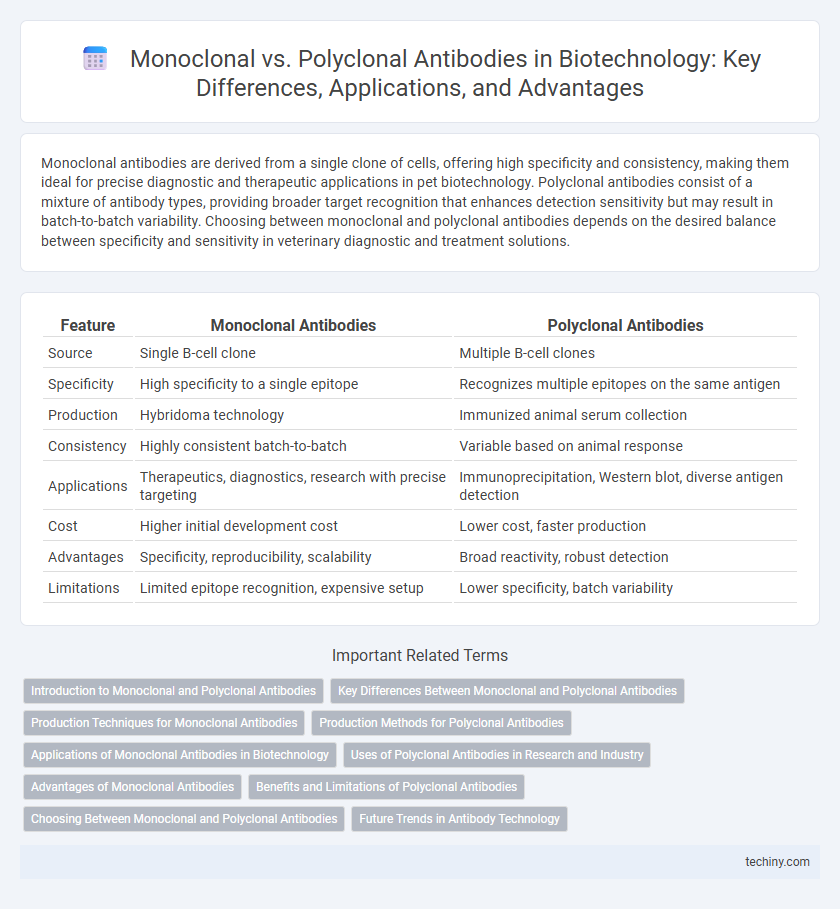Monoclonal antibodies are derived from a single clone of cells, offering high specificity and consistency, making them ideal for precise diagnostic and therapeutic applications in pet biotechnology. Polyclonal antibodies consist of a mixture of antibody types, providing broader target recognition that enhances detection sensitivity but may result in batch-to-batch variability. Choosing between monoclonal and polyclonal antibodies depends on the desired balance between specificity and sensitivity in veterinary diagnostic and treatment solutions.
Table of Comparison
| Feature | Monoclonal Antibodies | Polyclonal Antibodies |
|---|---|---|
| Source | Single B-cell clone | Multiple B-cell clones |
| Specificity | High specificity to a single epitope | Recognizes multiple epitopes on the same antigen |
| Production | Hybridoma technology | Immunized animal serum collection |
| Consistency | Highly consistent batch-to-batch | Variable based on animal response |
| Applications | Therapeutics, diagnostics, research with precise targeting | Immunoprecipitation, Western blot, diverse antigen detection |
| Cost | Higher initial development cost | Lower cost, faster production |
| Advantages | Specificity, reproducibility, scalability | Broad reactivity, robust detection |
| Limitations | Limited epitope recognition, expensive setup | Lower specificity, batch variability |
Introduction to Monoclonal and Polyclonal Antibodies
Monoclonal antibodies are identical immunoglobulins produced from a single B-cell clone, targeting a specific epitope with high specificity, making them essential for therapeutic and diagnostic applications. Polyclonal antibodies consist of a heterogeneous mix of immunoglobulins derived from multiple B-cell clones, recognizing multiple epitopes on the same antigen, which provides enhanced sensitivity in detection assays. Both antibody types play crucial roles in biotechnology, with monoclonal antibodies preferred for precision and reproducibility, while polyclonal antibodies offer broader antigen recognition.
Key Differences Between Monoclonal and Polyclonal Antibodies
Monoclonal antibodies are derived from a single B-cell clone, providing high specificity by targeting a single epitope on an antigen, whereas polyclonal antibodies consist of a diverse mixture from multiple B-cell clones that recognize multiple epitopes. Monoclonal antibodies exhibit consistent batch-to-batch reproducibility, making them ideal for diagnostic and therapeutic applications, while polyclonal antibodies offer enhanced sensitivity due to their heterogeneous nature. The production process for monoclonal antibodies involves hybridoma technology, contrasting with the animal immunization method used for polyclonal antibodies.
Production Techniques for Monoclonal Antibodies
Monoclonal antibody production employs hybridoma technology, where a specific B-cell is fused with a myeloma cell to create a continuous cell line that produces identical antibodies. This process involves immunizing an animal, usually a mouse, isolating spleen cells, and selecting clones that secrete the desired monoclonal antibody. In contrast, polyclonal antibody production relies on the immune response of the host animal, generating a heterogeneous mixture of antibodies targeting multiple epitopes without clonal selection or cell line establishment.
Production Methods for Polyclonal Antibodies
Polyclonal antibodies are produced by immunizing an animal, typically a rabbit, goat, or sheep, with a specific antigen to trigger an immune response generating diverse antibody populations. After repeated antigen exposures, blood is collected, and serum containing polyclonal antibodies is purified using techniques such as protein A/G affinity chromatography or antigen-specific affinity purification. This production method yields a heterogeneous mixture of antibodies targeting multiple epitopes on the antigen, offering high sensitivity in various biotechnological applications like ELISA, Western blotting, and immunohistochemistry.
Applications of Monoclonal Antibodies in Biotechnology
Monoclonal antibodies are widely utilized in biotechnology for targeted therapeutic applications, including cancer immunotherapy, autoimmune disease treatment, and infectious disease diagnostics. Their high specificity enables precise detection and quantification of biomarkers in assays such as ELISA, flow cytometry, and Western blotting. Production consistency and batch-to-batch reproducibility make monoclonal antibodies essential tools in drug development and biomarker validation.
Uses of Polyclonal Antibodies in Research and Industry
Polyclonal antibodies are extensively used in research and industry for their ability to recognize multiple epitopes on a single antigen, enhancing detection sensitivity in applications such as ELISA, Western blotting, and immunohistochemistry. Their diverse epitope binding makes them ideal for detecting proteins with low abundance or complex conformations. Industrially, polyclonal antibodies are employed in diagnostic kits, quality control, and therapeutic drug monitoring due to their robust specificity and production cost-effectiveness.
Advantages of Monoclonal Antibodies
Monoclonal antibodies offer high specificity by targeting a single epitope, reducing cross-reactivity and enhancing diagnostic accuracy in biotechnology applications. Their uniformity ensures consistent batch-to-batch performance, critical for reproducibility in therapeutic development and research. These attributes make monoclonal antibodies preferable over polyclonal antibodies for precise targeting in drug delivery and disease detection.
Benefits and Limitations of Polyclonal Antibodies
Polyclonal antibodies offer high sensitivity and can recognize multiple epitopes on a single antigen, making them valuable for detecting proteins with diverse structures or post-translational modifications. Their production is faster and less expensive compared to monoclonal antibodies, but batch-to-batch variability and limited specificity can pose challenges in reproducibility. These antibodies are ideal for applications requiring robust detection but may generate higher background noise in assays demanding precise targeting.
Choosing Between Monoclonal and Polyclonal Antibodies
Choosing between monoclonal and polyclonal antibodies depends on the specificity and sensitivity required for a biotechnological application. Monoclonal antibodies offer high specificity by targeting a single epitope, making them ideal for therapeutic and diagnostic uses requiring uniformity. Polyclonal antibodies provide broader detection across multiple epitopes, enhancing sensitivity and tolerance to antigen variability in assays like Western blotting and ELISA.
Future Trends in Antibody Technology
Monoclonal antibodies offer high specificity and reproducibility, driving advancements in targeted therapies and diagnostic applications, while polyclonal antibodies provide broader antigen recognition suitable for diverse immunoassays. Emerging trends in antibody technology include the development of bispecific antibodies, antibody-drug conjugates, and engineered antibody fragments to enhance therapeutic efficacy and reduce off-target effects. Integration of artificial intelligence and high-throughput screening is accelerating the discovery and optimization of next-generation antibody candidates with improved binding affinity and stability.
Monoclonal vs Polyclonal Infographic

 techiny.com
techiny.com